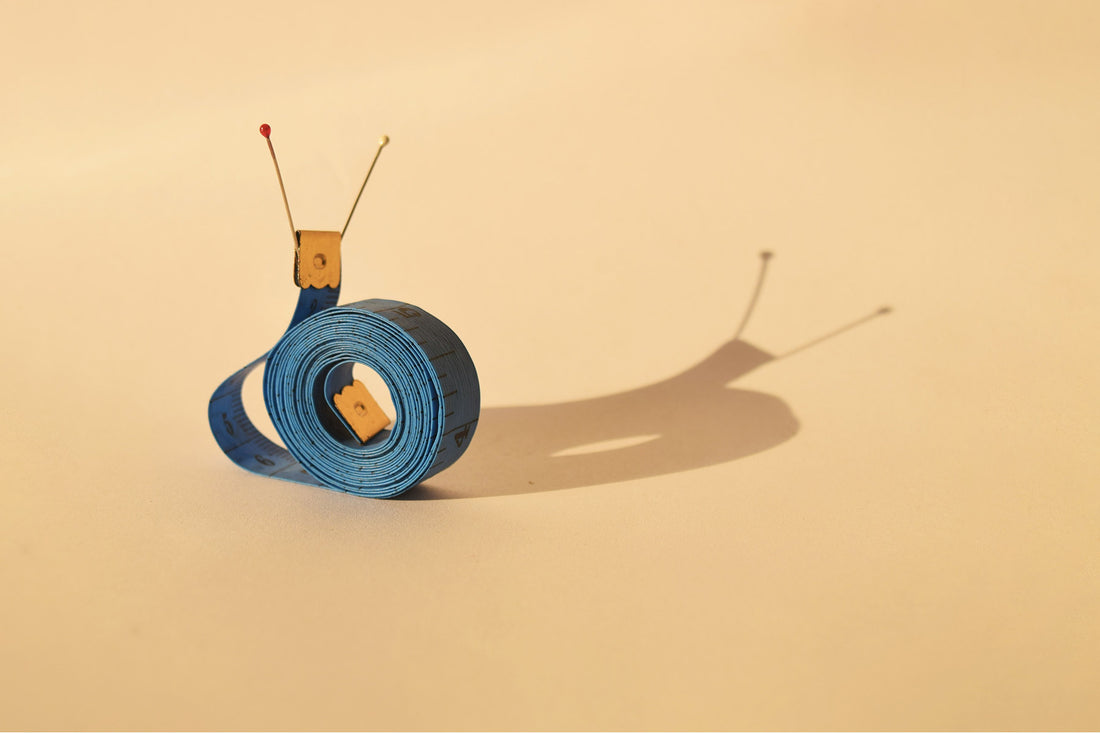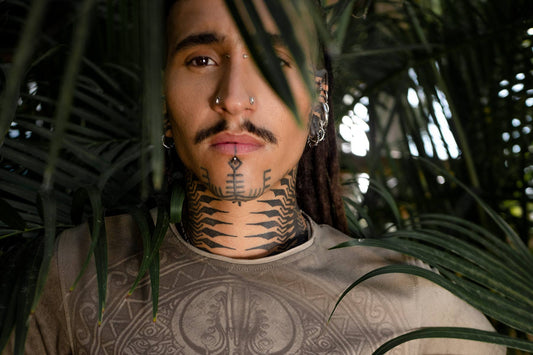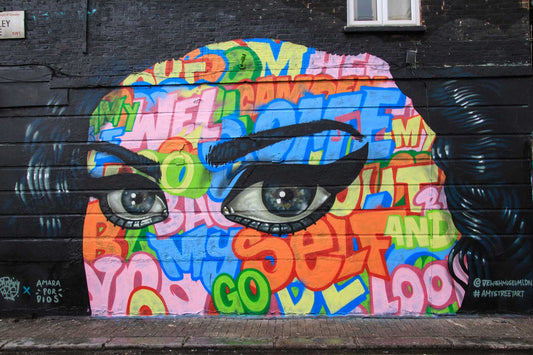Slow Fashion History & Principles
In a nutshell: slow fashion is the opposite alternative to fast fashion. Slowing, as a concept, is about thinking in the long term. It’s about honouring our past by being present in the now and nourishing life as our future. It’s about encouraging diversity.
The slowdown was born as a cultural movement that seeks to lead a change in the way we utilize our most precious resource - time. It goes against the Western world's obsession with achievement, profitability, activism, and the exploitation of time, and raises a question of principle as to the best way to use it. Emerging in the 1980s in Italy, at a protest event aimed at opening a McDonald's branch at 'Piazza di Spagna' in Rome, Italy. The protest led to the development of the slow food movement, aimed at responding to the growing popularity of industrialized, standardised fast food and the fear that it would eliminate local kitchen traditions. The ‘slow food’ movement was to counteract the potential for ‘fast food’ world domination.
The problem, as seen in the eyes of the Slow movement, being the loss of connection brought by the industrialized revolution and the alienation of people from methods and processes of production. We’re no longer connected: to each other, to how our food, clothing, and shelter are coming about. we lost the connections to the people and environment which created them through our fast-living lifestyles and social structures. So as a solution, this movement is asking us to slow down to foster and nourish those lost connections. As the philosopher Guttorm Fløistad puts it:
"The only thing for certain is that everything changes. The rate of change increases. If you want to hang on you better speed up. That is the message of today. It could however be useful to remind everyone that our basic needs never change. The need to be seen and appreciated! It is the need to belong. The need for nearness and care, and for a little love! This is given only through slowness in human relations. In order to master changes, we have to recover slowness, reflection, and togetherness. There we will find real renewal."
Quality Quantity
In a similar way to the food industry, slow fashion goes against the industrialized and homeganized fast fashion practices. Applied to fashion, the ‘slow’ concept is about advocating for manufacturing with respect to people, the environment, and animals. It involves supporting local artisans and using sustainable materials, with the goal of preserving craft traditions and the environment and, ultimately, providing value to both consumers and producers.
“It encompasses awareness and approach to fashion that considers the processes and resources required to make clothing. It advocates for buying better-quality garments that will last longer, and values fair treatment of people, animals, and the planet along the way.”
In this video, you can see the making of traditionally hand-printed original ‘Endak’ fabric from Bali. It's just one of the ways in which creating our ethical streetwear at the Psylo independently-run HQ on the 'Island of the Gods' - helps preserve local traditions of Art & Craft.
Goodonyou.eco are listing 6 main characteristics of a slow fashion brand, here is how Psylo fits in:
 01_“Made from high quality, sustainable materials like linen”
01_“Made from high quality, sustainable materials like linen”
When researching for new materials and fabrics to work with, Psylo’s designers are actively balancing between local sourcing, transparent and trackable supply chain, environmental impacts, as well as durability and feel of the fabrics. Considering all these different factors requires vision and long-term thinking identifiable with the Slow movement (and it's also why we love creating with GOTS-certified fabrics!)
 02_“Garments are more timeless than trendy”
02_“Garments are more timeless than trendy”
Psylo was never about following trends but about creating style rooted in lifestyle. Organically evolving over the past 20+ years to answer our customers' needs, Every Psylo piece of clothing is more than stitched fabrics thrown together to meet the demand of trendsetters. It is the result of a deeply thought-of process of alchemy - ancient art, sacred symbolism, contemporary art, cultural history, and the essence of humanity. To discover our timeless styles, you’re invited to explore Psylo’s time machine.
 03_“Often sold in smaller (local) stores rather than huge chain enterprises”
03_“Often sold in smaller (local) stores rather than huge chain enterprises”
The only places where you can buy Psylo are in one of our 6 flagship stores or independently-owned exclusive boutiques around the world. Our wholesale partners share Psylo's values and vision. With our strong roots in the music festival scene - that same open-mindedness of the festival spirit is strongly living in our shops. Everybody who visits us around the world knows the welcoming atmosphere and unique feel & energy.
 04_“Locally sourced, produced, and sold garments”
04_“Locally sourced, produced, and sold garments”
Each and every piece of Psylo clothing is produced under the same roof at our Bali HQ. Using locally sourced organic, natural, or even up-cycled materials - whenever and wherever we can. Each garment is handmade to perfection by our local team of skilled artisans who love their crafts. Helping support local traditions of Arts & Crafts is one of the reasons why we love creating in Bali! And although it’s true we do not sell locally, we always encourage people to physically visit one of our shops if they’re in town. Or to search for locally-made high-quality stylish streetwear that will last them for years, like Psylo (to find out more visit sustainability at Psylo).
 05_“Few, specific styles per collection, which are released twice or maximum three times per year, or a permanent seasonless collection”
05_“Few, specific styles per collection, which are released twice or maximum three times per year, or a permanent seasonless collection”
Our ethical & alternative streetwear is a mix of both. Designed as a capsule wardrobe ever since the first launch back in 1999, our designers create a minimalistic collection of durable and timeless streetwear designed to last you for years and decades to come. In each production cycle, we create both styles which are part of our permanent seasonless collection. Alongside these Psylo essentials, our designers answer our customers’ needs to refresh their style with one or two yearly collections. These are produced as limited editions and are gradually being released throughout the year. To discover our yearly collections, check out our lookbooks.
 06_"Often made-to-order to reduce unnecessary production"
06_"Often made-to-order to reduce unnecessary production"
The independently-owned Psylo factory produces only what has been ordered from our shops and wholesalers. As a business model, it means that sizes or colours go out of stock sometimes, but it ensures nothing goes to waste! While we also recycle and upcycle our fabric scraps - making them into our signature Pecoa line.
How Psylo is Advocating for Slow Fashion?
We actively seek better materials and ways to improve our methods and processes as producers. Moreover, we see our clothing as a tool to connect to people and help them make more sustainable choices. It’s known that choosing a more sustainable alternative means greater production costs which reflect in our products’ price point. This is why we run seasonal sales to give people the opportunity to experience ethical wear. We hope that once they feel the quality materials on their body, and the clean vibes connected to wearing our slow fashion - they will choose to stop buying fast fashion.
There are more avenues through which you can find Psylo advocating for slow fashion through. As designers & makers working to the highest quality, part of the reality of the process of creation is that in each production cycle - not all garments will meet our standards. To avoid waste of material and our artisans' work, we bring these almost-perfect clothing to our summer festivals tours. There, we know that everybody loves a good deal, and our festivals community is happy to fix small faults by hand or appreciate that extra character given to the clothing.

Kadek Setiawan, our "finishing" master, has been working on Psylo's accessories, stud-work, custom-made buttons, and more - since 2010. To find out more visit Meet the Psylo Team.
Recommended further reading:
01_Check out this informative article:
>>> Avoiding Fast Fashion: How to Get a More Sustainable Wardrobe
02_Learn about how to make the most of your clothes with our guide:
>>> 5 tips on how to make your clothing last
03_Vivianne Westwood once said "Buy less. Choose well. Make it last" - find out how to curate the right collection that works for you:








